The 5th Annual Yankee Editors’ Choice Food Awards
Celebrating New England’s best cheeses, meats, jams, sweets, and other gift-worthy treats in Yankee Magazine’s annual food awards.
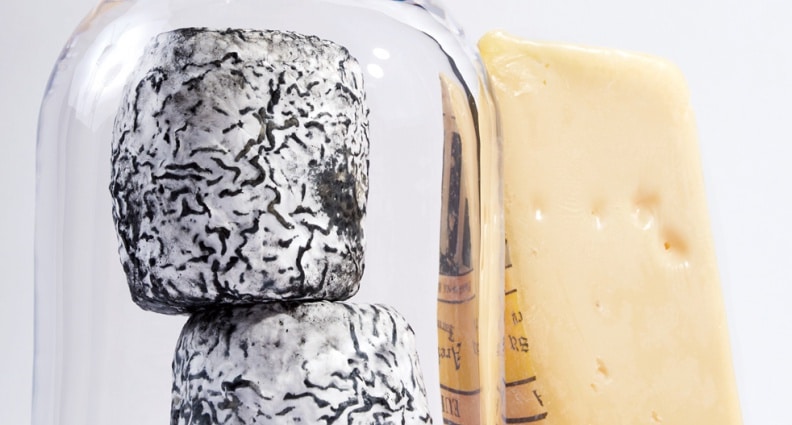
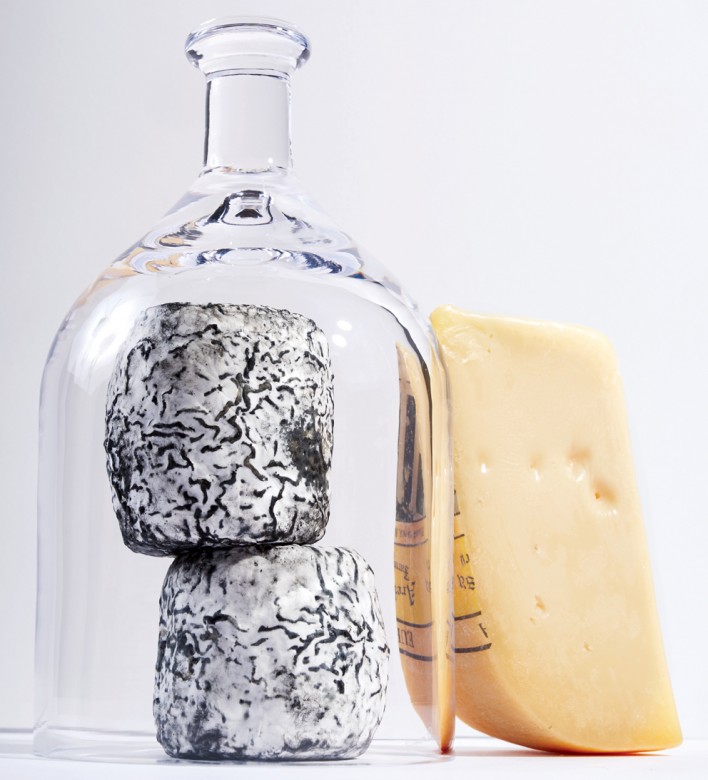
Photo Credit : Photo by Mark Fleming/Styling by Krissy O’Shea
CHEESES
MOUNTAIN ASH Sweet Rowen Farmstead | West Glover, Vermont
When Paul Lisai describes his dairy farm in Vermont’s Northeast Kingdom as “pasture-based,” he’s not waxing poetic—he’s getting to the heart of what makes his cheeses so good. “It all starts with the grass,” he says (rowen is the Scottish word for the second cut of hay used to feed the cattle in winter). That quality feed, combined with the carefully chosen genetics of his herd of 30 Vermont Heritage Lineback cattle, yields the nutrient-dense milk that Lisai hands over to cheese maker Blair Johnson. He, in turn, transforms it into semi-aged Camembert-style beauties such as Mountain Ash, which is coated in a thin layer of food-grade ash, giving the cheese a subtle smokiness to play off its buttery-nutty notes. Making Mountain Ash is a labor-intensive process, requiring 14 hours to culture, then a day of hand-ladling the curd, six ounces at a time, into molds. “It gives it that nice, fluffy, really creamy texture,” Lisai says. After draining and hand-salting, the cheese is dried and ashed; two weeks later it’s sent to market. Though Lisai is a first-generation farmer, he’s a seventh-generation Vermonter. “I have really strong ties to the culture and place,” he says. “I’ve worked for a lot of farmers in the 14 years I’ve been here, and I still call my neighbor when we’re going to hay, to discuss the weather and our strategy for the day. That kind of community is pretty important.”Suggested retail $9 per 8 oz. round. Available at several Vermont farmers’ markets, including Burlington, Montpelier, and Stowe; and at a number of retailers in Vermont and New Hampshire, including City Market in Burlington, Hunger Mountain Co-op in Montpelier, and the Brattleboro Food Co-op. sweetrowen.com
CHÈVRE ROLLED IN HERBES DE PROVENCE Kennebec Cheesery | Sidney, Maine
The best chèvres strike a balance of ultracreamy and tangy that’s worlds apart from the bland, chalky (or worse, funky) paste that can turn people off goat cheese for good. From her herd of 62 goats at Kennebec Cheesery, Jean Koons produces milk and cheeses whose vivid richness is worth seeking out whenever you travel through Maine. We’re especially fond of the chèvre that comes cloaked in savory herbs and lavender (all locally sourced), which is delicious on toast, in salads, and on pizza.
A native New Zealander, Koons has been farming all her life, but she began making cheese only in 2001—taking classes from local cheese makers, choosing the best breeds and feeds, and fiddling with her recipes until she settled on just the right blend. As she sees it, there’s one critical ingredient not listed on her labels: “very happy goats.”
Suggested retail $5.50 per roll (4-6 oz.). Available at several Maine stores, such as Portland Food Co-op, Blue Hill Co-op, and Uncle Dean’s Good Groceries in Waterville, as well as at the Portland, Belgrade Lakes, and Waterville farmers’ markets. kennebeccheesery.com
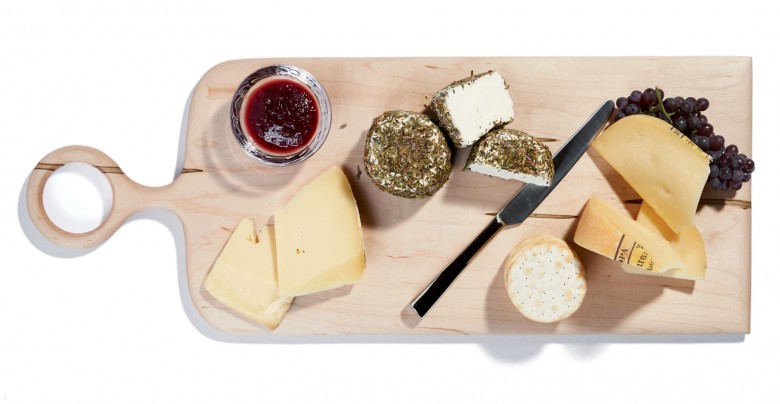
Photo Credit : Photo by Mark Fleming/Styling by Krissy O’Shea
EUROPA Arethusa Farm | Litchfield, Connecticut
George Malkemus and Anthony Yurgaitis did not set out to become dairy farmers or cheese makers. As senior executives at Manolo Blahnik, they had been dividing their lives among New York, Europe, South America, and their weekend house in Connecticut. But when the 350-acre horse farm across the street from their house came up for sale in 1999, they bought it to prevent developers from reshaping the landscape. After that, it seemed only natural to gradually return the place to its roots as a dairy farm.
Today Arethusa Farm is home to nearly 400 cows, several barns (a sign in one reads: “Every cow in this barn is a lady, please treat her as such”), a restaurant, a retail shop, and a café. In a converted fire station down the road, Chris Casiello oversees the creamery, where milk from the Holstein, Jersey, and Brown Swiss cows is made into fresh and aged cheeses by head cheese maker Matt Benham. For their Europa, which is based on a classic Gouda, “we’ve used different cultures to make a richer flavor profile than a standard Gouda,” Casiello says. There’s a hint of sweetness but also flavors of edamame and savory broth. A great melter, Europa can be used in grilled cheese, fondue, and mac and cheese.
Suggested retail $8 per 8 oz. Available at Arethusa Farm’s retail stores in Bantam and New Haven, CT, and at several Whole Foods stores and gourmet shops around New England. arethusafarm.com

Photo Credit : Photo by Mark Fleming/Styling by Krissy O’Shea
SWEETS
BOLIVIA BAR Vicuña Chocolate | Peterborough, New Hampshire
When we first heard about Neely Cohen, the young pastry chef who took her earnings from winning the Food Network’s Sweet Genius competition and opened a bean-to-bar chocolate shop in her New Hampshire hometown in 2014, we were intrigued. Beginning with organic cacao beans sourced from farms in Central and South America, she tackled the process of sorting, cracking, winnowing, and stone-grinding the beans, then tempering the chocolate, blending it with sugar, and molding it into bars. It’s a tremendous amount of extra effort, which is why most chocolatiers opt to work with premade chocolate as their base. One bite of her Bolivia bar—which melts into a silky spectrum of coffee, nut, and subtle berry flavors—and we were hooked.
But the story doesn’t end there. Just last summer, feeling the pull to return to her “other hometown” of Tel Aviv, Cohen sold the business to two ambitious entrepreneurs who also happened to be 17-year-old high school grads. Nate Morison and Casey Goodrich, friends since fifth grade, are passionate about making great chocolate, so they studied Cohen’s methods and, with help from their families, started planning to expand Vicuña’s retail and wholesale markets while continuing to operate the chocolate café in downtown Peterborough.
For her part, Cohen couldn’t be prouder. “It’s bittersweet to say good-bye,” she says, “but Nate and Casey have what it takes to build on the foundation of quality and integrity that is Vicuña. I’ll be cheering them on from the sidelines.”
Suggested retail $10 per 2.9 oz. bar. Available at Vicuña’s website and its Peterborough store, as well as at Monadnock Food Co-op in Keene, Profile Coffee Bar in Portsmouth, and Darwin’s Ltd. in Cambridge, MA. vicunachocolate.com
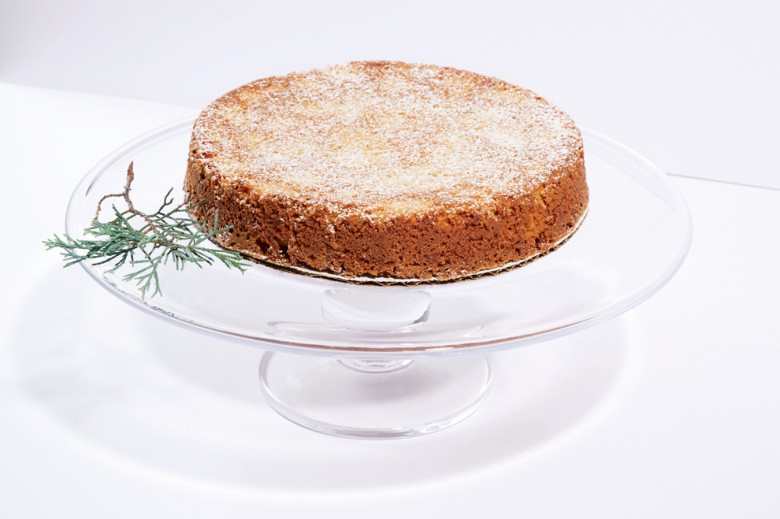
Photo Credit : Photo by Mark Fleming/Styling by Krissy O’Shea
GLUTEN-FREE ALMOND CAKE Mayfair Farm | Harrisville, New Hampshire
When Sarah Heffron and her husband, Craig Thompson, purchased Mayfair Farm in 2011, her mother’s advice was simple: “Do anything, but don’t go into the food business.” As a chef and caterer, Mom was speaking from experience, but Heffron didn’t listen. Growing up on eastern Long Island among potato farms and vineyards had already left its mark—food was her passion. So, after leaving their successful livestock business in South Carolina to buy Mayfair Farm in New Hampshire’s Monadnock region, she and Thompson saw the potential to create a diversified enterprise that included livestock, orchards, an events and catering operation, and a bakery that produces their super-lative almond cake, as richly flavored as marzipan but tender and buttery and not too sweet.
Heffron and Thompson tap their network of farmers and makers to secure the best pasture-raised eggs, butter, and other ingredients for the bakery. “We obviously can’t get local almonds, but we support other farms as much as we can,” Heffron says. The cake is gluten-free, but she insists this is coincidence, not culinary trend-watching. It’s a recipe she has perfected over the past 10 years, and she remembers the exact moment she knew it was going to be a hit: when her Austrian grandmother, Stella, an experienced baker, gave it the thumbs-up. Heffron recalls thinking that if Stella liked it, “we’re going to be OK.”
Suggested retail $20 per 8-inch cake. Available at Mayfair Farm’s website and its Harrisville store, as well as at retail stores throughout the Monadnock Region and select Whole Foods locations. mayfairfarmnh.com
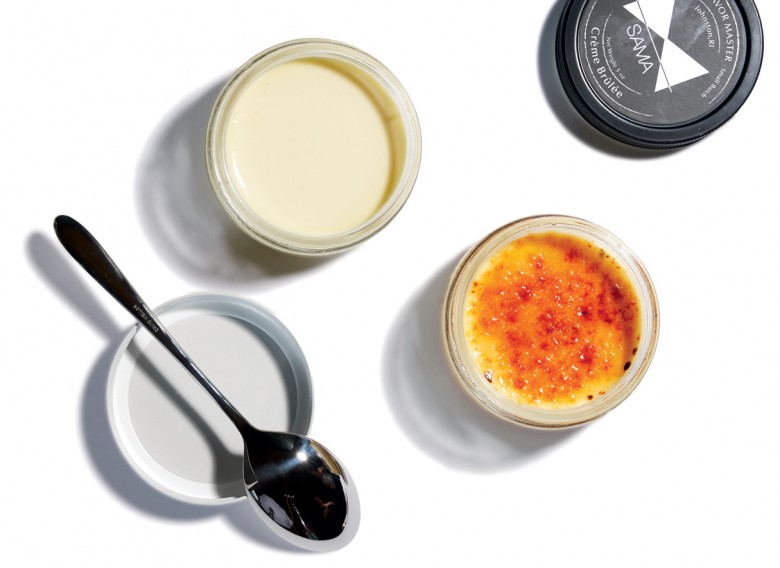
Photo Credit : Photo by Mark Fleming/Styling by Krissy O’Shea
CRÈME BRÛLÉE Sama Confections | Johnston, Rhode Island
Most of the stories we tell about producers have a similar arc: A passionate cook begins making a product (say, jam) as a hobby. She gives it out to friends, who exclaim, “You should sell this!” After a trial run at a farmers’ market, a business is born.
This is not that kind of story. Sama was launched by four sweet-toothed friends in their late twenties. Applying their backgrounds in sales and marketing, they came up with a concept first—restaurant-quality desserts in jars to serve at home or give as gifts—then they began working on the recipes. After several months of testing, they had a line of five puddings that ranged from a fantastically creamy French-style crème brûlée (really more of a crème caramel, as the sugar sauce is on the bottom) to a Japanese-inspired matcha mousse to a Chinese milk pudding topped with sweet red beans.
We love them all, but the French custard—cooked in a gentle sous vide water bath to reach peak richness—is remarkable. CEO Rongchen Li recently quit his real estate job to focus on Sama full-time, and demand is growing (they also sell wholesale to restaurants). Up next: a line of vegan products and a retail shop in Boston. “At the beginning, we thought wholesale would be much easier, but I think you don’t have a chance to meet with your customers,” he says. “Now it’s time to try retail and really let people know what we do.”
Suggested retail $5.50 per 5 oz. jar. Available at Sama’s website and its Johnston retail location, as well as at Russo’s Market in Watertown, MA; Kung Fu Tea stores in Greater Boston; and others. samaconfections.com
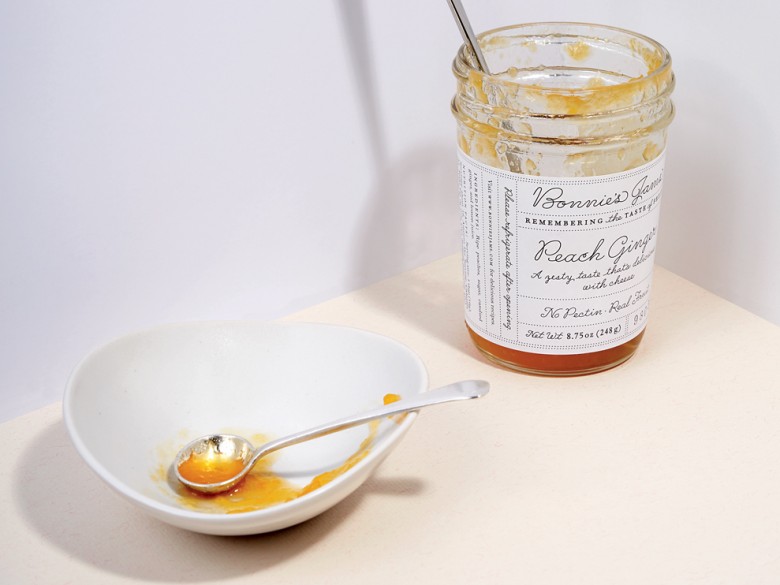
Photo Credit : Photo by Mark Fleming/Styling by Krissy O’Shea
PRESERVES + SAUCES
PEACH-GINGER JAM Bonnie’s Jams | Cambridge, Massachusetts
As a child in Southern California, Bonnie Shershow would often step outside and take her pick from her family’s apricot and lemon trees and berry bushes, as well as the nearby orange grove. When she moved to the East Coast, she says, “I didn’t realize it wasn’t normal to pick up an apricot and have it taste like an apricot!” Her solution? Turn quality fruit into jam, thereby concentrating and preserving the flavors. In 1999, she took a batch to a local restaurant and asked the chef if she could use his kitchen. He obliged, and every Sunday she would craft jams and jellies there to sell to the restaurant and a few other businesses.
These days, Shershow has her own space and a small staff to help her make her jams, which are now sold on shelves across the country. Her mother’s original recipe hasn’t changed. “I had always made jams in small batches with no pectin, a little bit of sugar, and some lemon juice,” she says, and she remains true to her original intent: to let the flavor of the fruit shine through. Despite supplying several nationwide chains and international distributors, she says it’s “really exciting to get requests from small, locally owned shops.”
Shershow recommends spreading her peach-ginger jam on chicken, fish, or pork, or pairing it with a Tomme-style cheese or fresh chèvre.
Suggested retail $10 per 8.75 oz. jar. Available at Bonnie’s Jams’ website,as well as 40 Green Street Lunch in Northampton, MA; Nina June in Rockport, ME; Whole Foods; Williams Sonoma; and other local and national retailers. bonniesjams.com
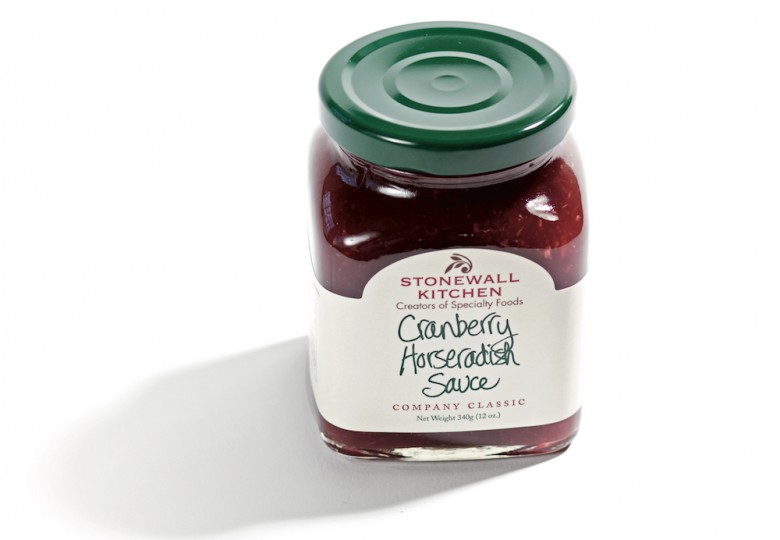
Photo Credit : Photo by Mark Fleming/Styling by Krissy O’Shea
CRANBERRY-HORSERADISH SAUCE Stonewall Kitchen | York, Maine
Lovers of horseradish will immediately recognize the beauty of pairing this spicy root with a sweet-tart cranberry sauce. The two bright flavors perform a kind of tango on the tongue, smoothing out each other’s rough edges while giving a spunky kick to classic holiday foods (think turkey, smoked meats, shrimp, creamy cheeses, and cheddar). Even if you don’t typically like horseradish, give this one a try. The product has been a fan favorite since Stonewall first introduced it in 1993, earning it a “Company Classic” designation alongside the blueberry jam and the red pepper jelly.
Suggested retail $7 per 12 oz. jar. Available at Stonewall Kitchen’s website and retail shops, as well as at many supermarkets and specialty food stores around New England and across the country. stonewallkitchen.com
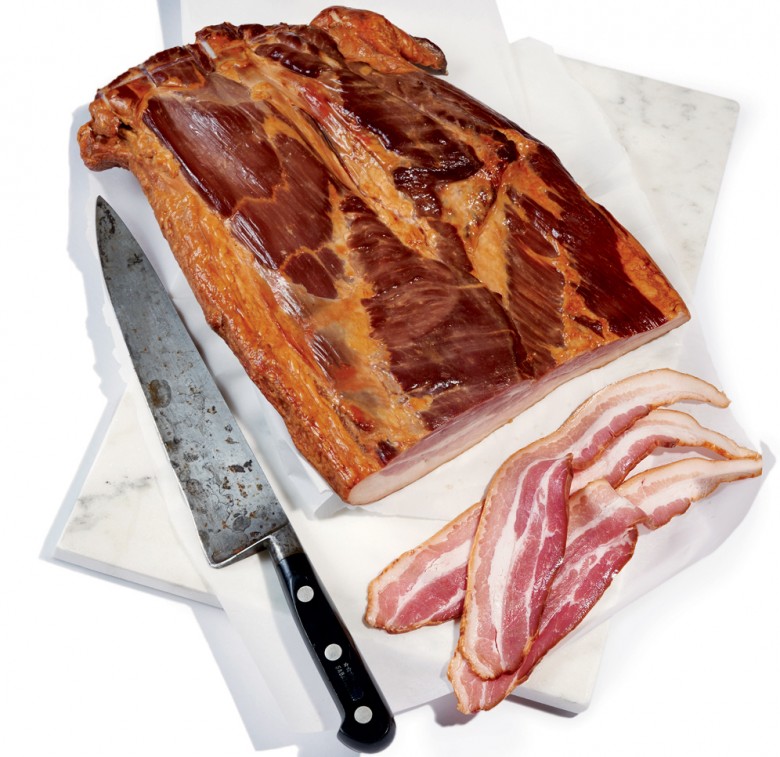
Photo Credit : Photo by Mark Fleming/Styling by Krissy O’Shea
MEATS
APPLEWOOD-SMOKED BACON North Country Smokehouse | Claremont, New Hampshire
There are so many good things to mention about North Country Smokehouse: its 105-year history, its sustainable sourcing from certified humane farms, its revitalization of downtown Claremont. But we’re talking about bacon here. And we could write sonnets to the smoky goodness of North Country’s thick-cut slabs. Starting with lean belly meat, the bacon is marinated in a maple syrup–based brine for several days, then double-smoked over local applewood at low temperatures. “This is a traditional northern New England–style recipe,” says Mike Satzow, executive vice president and grandson of company founder Abraham Satzow. “[It’s] the maple brine, and the fact that we smoke it so much longer—up to 12 hours. We take things slow up here.”
Suggested retail $18.75 per pound. Available at North Country Smokehouse’s website, as well as at Hannaford stores and many specialty food stores around New England. ncsmokehouse.com
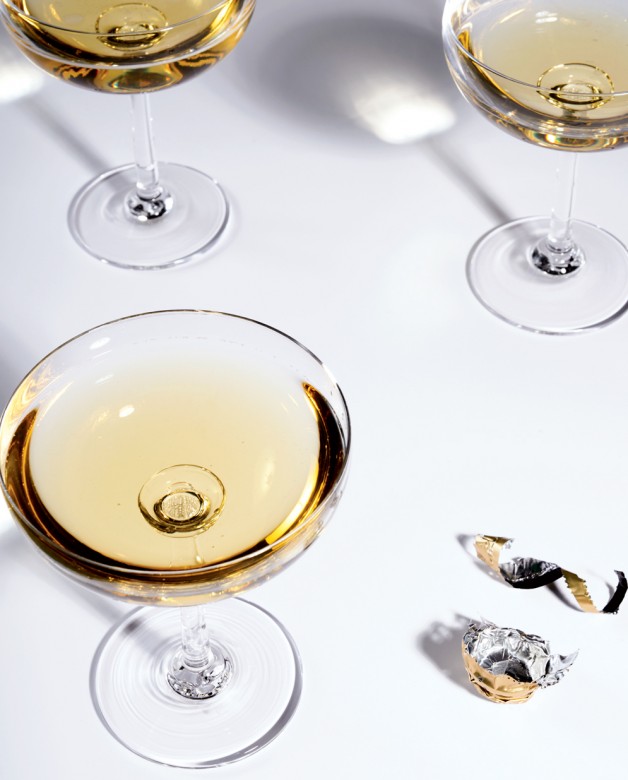
Photo Credit : Photo by Mark Fleming/Styling by Krissy O’Shea
DRINKS
PUTNEY BUBBLY SPARKLING CIDER Putney Mountain Winery | Putney, Vermont
The apple wine business is a second career for Kate Dodge, a lawyer by training, and her husband, Charles, a former Dartmouth professor. As with many of the makers featured here, it began for them as a hobby. In the late 1990s, inspired by some graduate students who had brewed their own beer, Charles decided to try it himself. Driving past an apple orchard every day on his way to and from work, he was struck by a thought: Why make beer from ingredients that need to be imported to Vermont when we’ve got plenty of apples right here? Shortly afterward, Putney Mountain Winery was born.
After a decade of trial and error, the hobby became a full-fledged business, and the Dodges quit their day jobs to pursue wine making. Today they produce nine wines, two liqueurs, and three juices, including their non-alcoholic sparkling cider, whose ingredients are simply fresh apples and bubbles. No sugar, water, or preservatives are added during the carbonation process, allowing the rich, crisp flavor of the heirloom apples to take center stage. This isn’t merely some syrupy alternative for the kids—it’s a genuine sipper, even without the alcohol.
The company’s Putney facility is a certified “Vermont Green Business” and fully solar-powered, and the apples it uses are sourced from a variety of farms in the area. “We believe the best-tasting products are local and don’t have to travel to get here,” Kate says.
Suggested retail $7.99 per 750 ml. bottle. Available at the winery’s tasting rooms in Putney, Windsor, and Quechee Gorge Village, as well as at the Brattleboro Farmers’ Market and many local food stores and co-ops in Vermont. putneywine.com
SEE MORE: 2016 Yankee Editors’ Choice Food Awards 2015 Yankee Editors’ Choice Food Awards 2014 Yankee Editors’ Choice Food Awards 2013 Yankee Editors’ Choice Food Awards
Amy Traverso
Amy Traverso is the senior food editor at Yankee magazine and co-host of the public television series Weekends with Yankee, a coproduction with WGBH. Previously, she was food editor at Boston magazine and an associate food editor at Sunset magazine. Her work has also been published in The Boston Globe, Saveur, and Travel & Leisure, and she has appeared on Hallmark Home & Family, The Martha Stewart Show, Throwdown with Bobby Flay, and Gordon Ramsay’s Kitchen Nightmares. Amy is the author of The Apple Lover’s Cookbook, which was a finalist for the Julia Child Award for best first-time author and won an IACP Cookbook Award in the “American” category.
More by Amy Traverso

